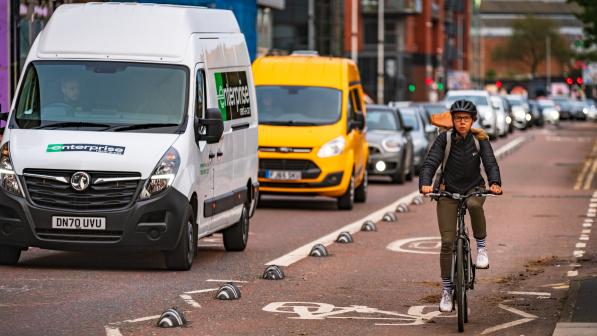“Rebalance transport funding urgently to meet net zero”, Cycling UK urges government

It’s imperative the UK government rebalances transport funding, Cycling UK urges ministers today (Wednesday, 28 June 2023) in light of a new report by the Climate Change Committee (CCC), which shows nearly all targets are being missed in its plans to hit net zero.
The CCC’s latest annual report, titled "Progress in Reducing UK Emissions: 2023 Report to Parliament", is highly critical in its remarks around transport, and concludes that the lack of urgency from the government and a failure of political leadership means progress has stalled.
Among the recommendations on transport were reversing active travel cuts, a review of future road building, as well as measures to reduce car demand, limiting motor traffic growth and giving more people the option to choose walking or cycling over driving.
To meet net-zero, the government needs to overcome its addiction to building roads, reverse the cuts to cycling and walking and invest to enable people to drive less and cycle more
Sarah Mitchell, Cycling UK's chief executive
Sarah Mitchell, Cycling UK’s chief executive, said:
“The Climate Change Committee has shown there is an urgent need to rebalance transport funding and stop relying on technological solutions to address tomorrow’s problems.
“To meet net-zero, the government needs to overcome its addiction to building roads, reverse the cuts to cycling and walking and invest to enable people to drive less and cycle more.”
As the report outlines, the government’s active travel budget received a substantial hit in March 2023. Dedicated capital funding for cycling and walking was cut by 75%, from around £200m per year in the past two years, to just £50m a year for this year and next.
This led the National Audit Office to find in its report of June 2023 that the government is failing to invest enough in active travel to meet its own modest targets of doubling cycling by 2025.
According to the CCC, the government needs to launch a strategic review to assess whether ongoing or planned road-building projects are consistent with its environmental goals.
At a UK level, various road-building projects have recently been pushed back due to what the report calls “fiscal headwinds”. The government should now follow the approach taken by the Welsh government, when it accepted the recommendations of its Independent Roads Review, “a welcome step which should contribute to reducing traffic growth”, as described by the CCC.
The move by the Welsh government included the cancelling of 31 of 48 road projects, which were reviewed on environmental grounds. It introduced stringent tests that will only permit new projects if they meaningfully contributed to modal shift, reducing emissions and adapting to the impacts of climate change.
The CCC also stressed there has been “no progress” on its previous recommendations on reducing demand for cars, and ensuring road-building decisions and taxation are aligned with it.
It also stated that not enough action has been taken to reduce motor traffic and limit its growth.
The report appeals to the Department for Transport to urgently publish new guidance to local transport authorities on what their transport plans should cover. Such refreshed guidance was promised in the Transport Decarbonisation Plan, detailing how to plan for, calculate and deliver quantifiable carbon reduction.
This has, however, not materialised, which the CCC says is “disappointing”.
A more positive finding in the report shows that local traffic schemes supported by government funding, such as 15-minute and low traffic neighbourhoods (“LTNs”), work effectively to reduce traffic, and some councils have been successful in their implementation.
A recent study referenced in the report, on LTNs in London, has shown that the schemes do not appear to have displaced traffic onto boundary roads, a concern raised in the past.
Instead of these potential negative effects, local schemes have offered a wide range of additional benefits to local communities. These range from providing more pleasant neighbourhoods to walk and cycle, which also allow local key services to thrive, to saving residents time and hassle as they no longer need a car to get around.
The majorities of both residents (61%) and local business owners (54%) also remain supportive of schemes in their areas.
The Government's current plans include spending billions on motorways and major A roads, while investment in cycling and walking infrastructure has been cut by 75%. We’re asking you to add your voice as we put pressure on the Government to change its priorities.
For a more in-depth analysis, see the blog by Cycling UK's policy director Roger Geffen.







